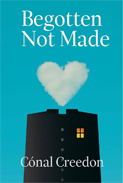
 |
Caught between indulgence and renunciation, young Brother Scully exchanged thoughts with Sister Claire for only an awkward hour in December 1970, but their love inspired a daily ritual of flashing lamps at dawn between monastery and convent. When her lamp fails to flash from her window on Christmas Day near the fiftieth anniversary of their serendipitous meeting, “his mind is haunted by memories, twisting and turning and churning around his tormented brain . . . He laughs at the painful loss of his innocence, and the brutal consequences of a single embrace that set his life trundling off the edge into the big black with no way back.” Brother Scully then relives that enchanting hour and the subsequent five decades of unconsummated love and rebellious scriptural analysis in a single day, revealing a tantalizing theory of the true paternity of Jesus Christ that turned his monastic vocation and his heart inside out.
Award-winning playwright, filmmaker, and author Cónal Creedon, who deals with biblical themes in some previous writings, describes his novel as “a fairy-tale for the twenty-first century.” This book spins a delicious yarn that tips nearly every sacred cow of Christianity—a timely sport in this era of diminished participation in monastic life and the laity’s scathing criticism of the Church’s sins and shortcomings—all the while spotlighting the archetypal unrequited romance made fresh in the monastic setting. In the backdrop is the soul of devout Irish Catholic culture and the lives of the working-class men and women of Cork who lend a down-to-earth stability to the tale as well as zest and color. As a bonus, the author includes his fanciful pen-and-ink drawings and tasty stories within the story, such as Sister Claire’s retelling of a saga about Mossie the Gardner and his war hero pigeon, Dowcha-boy. This is a plot thread sure to tickle even the most obstinate funnybone, and it specifically lends a magical yet realistic aura to what could have been a far more level, self-conscious story.
Though many masterful novelists have eschewed punctuation of various types, including the indomitable James Joyce, the lack of quotation marks in the dialogue takes some getting used to. But this attribute also lends a lean and mean playscript or screenplay effect, and the novel certainly could and should inspire a lively and memorable film or stage production. Creedon’s well-honed, multidimensional cast of characters, his vividly portrayed settings and interiors of 1970s and contemporary Cork, and his measured but lyrical prose nail every nuance of the story arc. The author has ripped open his Irish heart to spill this marvelous pastiche, a real-life creed that must be absorbed with one’s heart open wide to the pathos and poignancy of love lost and found, life lived and unlived, and spirituality bound to blind faith or soaring on the wings of perception. Ultimately, Creedon’s tour de force pays tribute to an end-of-life journey that paradoxically celebrates the winter of regret and the eye-opening gift of having nothing left to lose.
RECOMMENDED by the US Review